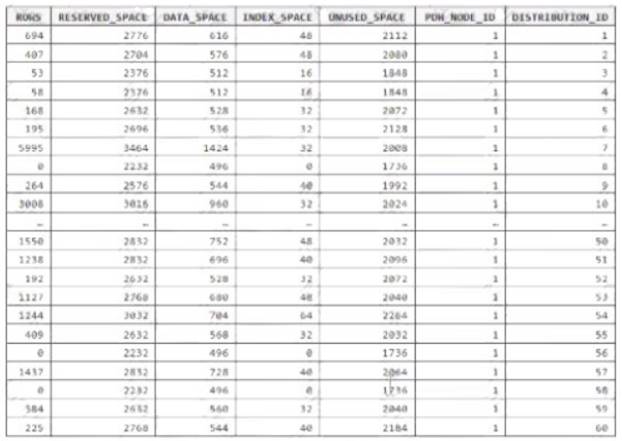- (Exam Topic 3)
You have an Azure Synapse Analytics dedicated SQL pool.
You run PDW_SHOWSPACEUSED(dbo,FactInternetSales’); and get the results shown in the following table.
Which statement accurately describes the dbo,FactInternetSales table?
Correct Answer:
C
Data skew means the data is not distributed evenly across the distributions. Reference:
https://docs.microsoft.com/en-us/azure/synapse-analytics/sql-data-warehouse/sql-data-warehouse-tables-distribu
- (Exam Topic 3)
You plan to create a table in an Azure Synapse Analytics dedicated SQL pool.
Data in the table will be retained for five years. Once a year, data that is older than five years will be deleted. You need to ensure that the data is distributed evenly across partitions. The solution must minimize the
amount of time required to delete old data.
How should you complete the Transact-SQL statement? To answer, drag the appropriate values to the correct targets. Each value may be used once, more than once, or not at all. You may need to drag the split bar between panes or scroll to view content.
NOTE: Each correct selection is worth one point.
Solution:
Box 1: HASH
Box 2: OrderDateKey
In most cases, table partitions are created on a date column.
A way to eliminate rollbacks is to use Metadata Only operations like partition switching for data management. For example, rather than execute a DELETE statement to delete all rows in a table where the order_date was in October of 2001, you could partition your data early. Then you can switch out the partition with data for an empty partition from another table.
Reference:
https://docs.microsoft.com/en-us/sql/t-sql/statements/create-table-azure-sql-data-warehouse https://docs.microsoft.com/en-us/azure/synapse-analytics/sql/best-practices-dedicated-sql-pool
Does this meet the goal?
Correct Answer:
A
- (Exam Topic 3)
You have an Azure subscription that contains an Azure Synapse Analytics dedicated SQL pool named Pool1. Pool1 receives new data once every 24 hours.
You have the following function.
You have the following query.
The query is executed once every 15 minutes and the @parameter value is set to the current date. You need to minimize the time it takes for the query to return results.
Which two actions should you perform? Each correct answer presents part of the solution. NOTE: Each correct selection is worth one point.
Correct Answer:
BD
https://learn.microsoft.com/en-us/azure/synapse-analytics/sql-data-warehouse/performance-tuning-result-set-cac
- (Exam Topic 3)
You are designing an inventory updates table in an Azure Synapse Analytics dedicated SQL pool. The table will have a clustered columnstore index and will include the following columns:
You identify the following usage patterns: Analysts will most commonly analyze transactions for a warehouse.
Analysts will most commonly analyze transactions for a warehouse. Queries will summarize by product category type, date, and/or inventory event type. You need to recommend a partition strategy for the table to minimize query times.
Queries will summarize by product category type, date, and/or inventory event type. You need to recommend a partition strategy for the table to minimize query times.
On which column should you partition the table?
Correct Answer:
C
The number of records for each warehouse is big enough for a good partitioning.
Note: Table partitions enable you to divide your data into smaller groups of data. In most cases, table partitions are created on a date column.
When creating partitions on clustered columnstore tables, it is important to consider how many rows belong to each partition. For optimal compression and performance of clustered columnstore tables, a minimum of 1 million rows per distribution and partition is needed. Before partitions are created, dedicated SQL pool already divides each table into 60 distributed databases.
- (Exam Topic 3)
You have a Microsoft Purview account. The Lineage view of a CSV file is shown in the following exhibit.
How is the data for the lineage populated?
Correct Answer:
B
According to Microsoft Purview Data Catalog lineage user guide1, data lineage in Microsoft Purview is a core platform capability that populates the Microsoft Purview Data Map with data movement and transformations across systems2. Lineage is captured as it flows in the enterprise and stitched without gaps irrespective of its source2.

